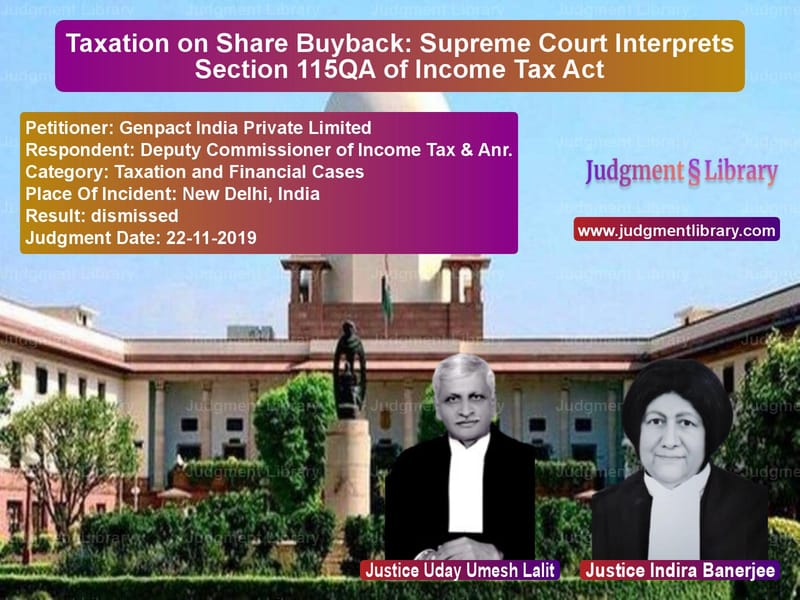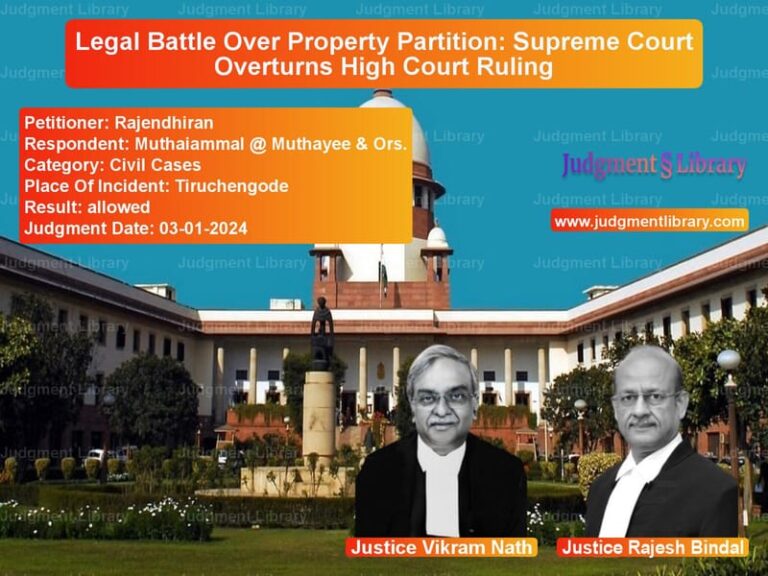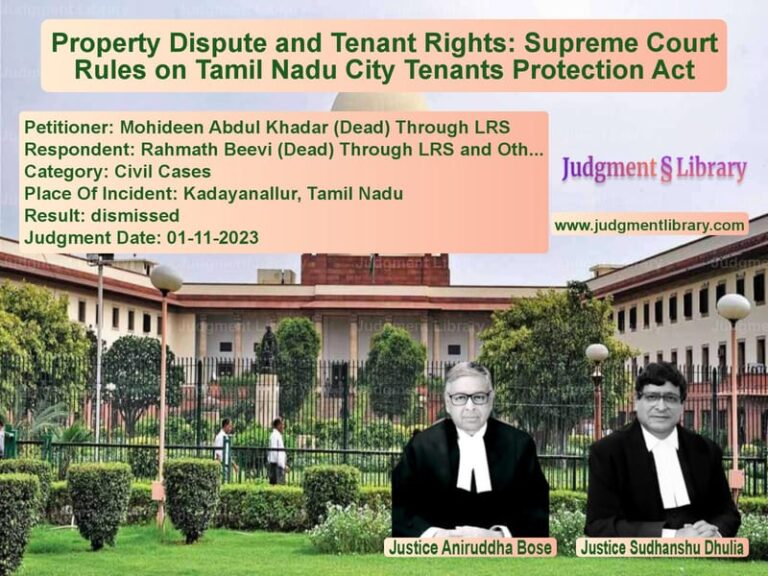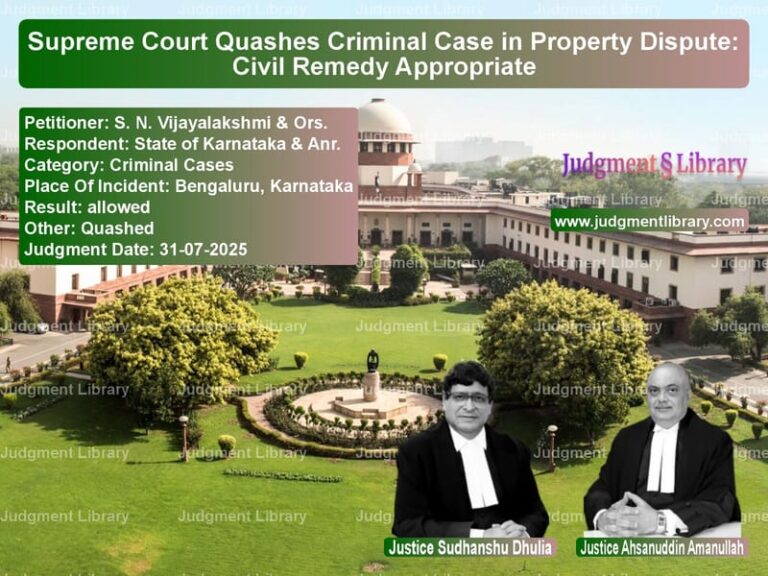Taxation on Share Buyback: Supreme Court Interprets Section 115QA of Income Tax Act
The Supreme Court of India, in the case of Genpact India Private Limited v. Deputy Commissioner of Income Tax & Anr., provided a significant ruling regarding the application of Section 115QA of the Income Tax Act, 1961. The case revolved around whether a buyback of shares conducted under a court-approved Scheme of Arrangement should be subjected to tax under this provision. The ruling clarifies several critical aspects of corporate tax law, including the interplay between buyback regulations and tax liability.
Background of the Case
The case stemmed from a buyback of shares executed by Genpact India Private Limited, a wholly owned subsidiary of Genpact India Investment, Mauritius. The company undertook the buyback in two phases:
- May 2013: 2,50,000 shares were bought back at Rs. 32,000 per share, totaling Rs. 800 crores.
- Post High Court approval (September 2013): 7,50,000 shares were bought back at Rs. 35,000 per share, amounting to Rs. 2,625 crores.
Meanwhile, the Finance Act, 2013, introduced Section 115QA, which imposed a 20% tax on distributed income in a buyback of shares by an unlisted company. This provision came into effect on June 1, 2013. The key legal issue in this case was whether a buyback executed under a court-approved scheme before this date was subject to tax under this section.
Legal Framework: Understanding Section 115QA
Section 115QA was introduced to curb tax avoidance by Indian subsidiaries of foreign companies. Many such entities resorted to buybacks instead of paying dividends, as buybacks were historically taxed as capital gains in the hands of shareholders, which could be exempt under treaties like the India-Mauritius DTAA. The new provision aimed to bypass this loophole by shifting the tax burden to the company conducting the buyback.
The key aspects of Section 115QA as initially enacted were:
- A 20% tax on distributed income in a buyback of shares by an unlisted company.
- “Distributed income” was defined as the buyback price minus the amount received by the company upon issuing the shares.
- The tax was final, meaning no further deduction or credit was allowed to either the company or shareholders.
In 2016, an amendment broadened the definition of buybacks, removing the specific reference to Section 77A of the Companies Act and making it applicable to any buyback conducted under any law. The appellant contended that the 2016 amendment could not apply retrospectively and, therefore, their buyback under a court-approved scheme was outside the scope of Section 115QA.
Arguments by the Petitioner (Genpact India)
Genpact India challenged the tax demand on the following grounds:
- The buyback was executed under a Scheme of Arrangement approved by the Delhi High Court and was not a buyback under Section 77A of the Companies Act, 1956.
- The original text of Section 115QA applied only to buybacks under Section 77A. Since their transaction occurred before the 2016 amendment, it could not be taxed under this section.
- The amendment broadening the scope of Section 115QA was not retrospective, and thus, applying it to the company’s buyback was unlawful.
- The demand under Section 115QA was separate from the regular tax assessment, meaning it should be challenged via a writ petition rather than an appeal.
Arguments by the Respondents (Income Tax Department)
The tax department defended the assessment, arguing:
- Section 115QA was introduced specifically to prevent tax avoidance by companies using buybacks as a means to repatriate earnings tax-free.
- The appellant took advantage of the India-Mauritius DTAA to avoid capital gains tax. Without Section 115QA, the entire transaction would have escaped taxation.
- Section 115QA, as originally enacted, was intended to apply to all forms of buybacks, and the 2016 amendment merely clarified this intent.
- The tax order was part of the regular assessment process, making it appealable before the Commissioner of Income Tax (Appeals). A writ petition was inappropriate.
Key Observations by the Supreme Court
1. Applicability of Section 115QA
The Supreme Court held that Section 115QA applies to buybacks conducted under a court-approved Scheme of Arrangement, provided the transaction meets the definitional criteria under the section. The Court ruled that the 2016 amendment merely clarified existing law rather than introducing a new tax obligation.
2. Nature of Tax Assessment
The Court determined that the assessment under Section 115QA was not separate from the company’s regular tax assessment. Thus, the appropriate remedy was to appeal before the Commissioner of Income Tax rather than approach the Supreme Court via a writ petition.
3. Availability of Alternate Remedy
Since an effective appellate remedy was available, the Court ruled that the writ petition was not maintainable. The Court emphasized that issues related to tax disputes should be resolved through the established appellate process.
4. No Jurisdictional Overreach
The Court rejected the argument that the tax authorities exceeded their jurisdiction. It held that Section 115QA was validly applied and that the demand was consistent with the legislative intent of the provision.
Final Judgment
The Supreme Court dismissed the appeal and upheld the tax demand under Section 115QA. The appellant was directed to pursue its case before the Commissioner of Income Tax (Appeals).
Conclusion
The ruling in this case sets a critical precedent for corporate taxation in India. It reinforces the principle that buybacks, regardless of how they are structured, are subject to taxation under Section 115QA if they meet the statutory criteria. The judgment underscores the importance of understanding tax implications before structuring buyback transactions and highlights the government’s intent to prevent tax avoidance through creative corporate maneuvers.
Companies engaging in buybacks should ensure compliance with all tax laws and consider potential liabilities under Section 115QA. The case also demonstrates the Court’s commitment to ensuring that tax disputes follow the proper channels of appeal, discouraging the use of writ petitions for tax-related matters unless extraordinary circumstances exist.
Petitioner Name: Genpact India Private Limited.Respondent Name: Deputy Commissioner of Income Tax & Anr..Judgment By: Justice Uday Umesh Lalit, Justice Indira Banerjee.Place Of Incident: New Delhi, India.Judgment Date: 22-11-2019.
Don’t miss out on the full details! Download the complete judgment in PDF format below and gain valuable insights instantly!
Download Judgment: Genpact India Privat vs Deputy Commissioner Supreme Court of India Judgment Dated 22-11-2019.pdf
Direct Downlaod Judgment: Direct downlaod this Judgment
See all petitions in Income Tax Disputes
See all petitions in Tax Evasion Cases
See all petitions in Tax Refund Disputes
See all petitions in Banking Regulations
See all petitions in Customs and Excise
See all petitions in Judgment by Uday Umesh Lalit
See all petitions in Judgment by Indira Banerjee
See all petitions in dismissed
See all petitions in supreme court of India judgments November 2019
See all petitions in 2019 judgments
See all posts in Taxation and Financial Cases Category
See all allowed petitions in Taxation and Financial Cases Category
See all Dismissed petitions in Taxation and Financial Cases Category
See all partially allowed petitions in Taxation and Financial Cases Category







